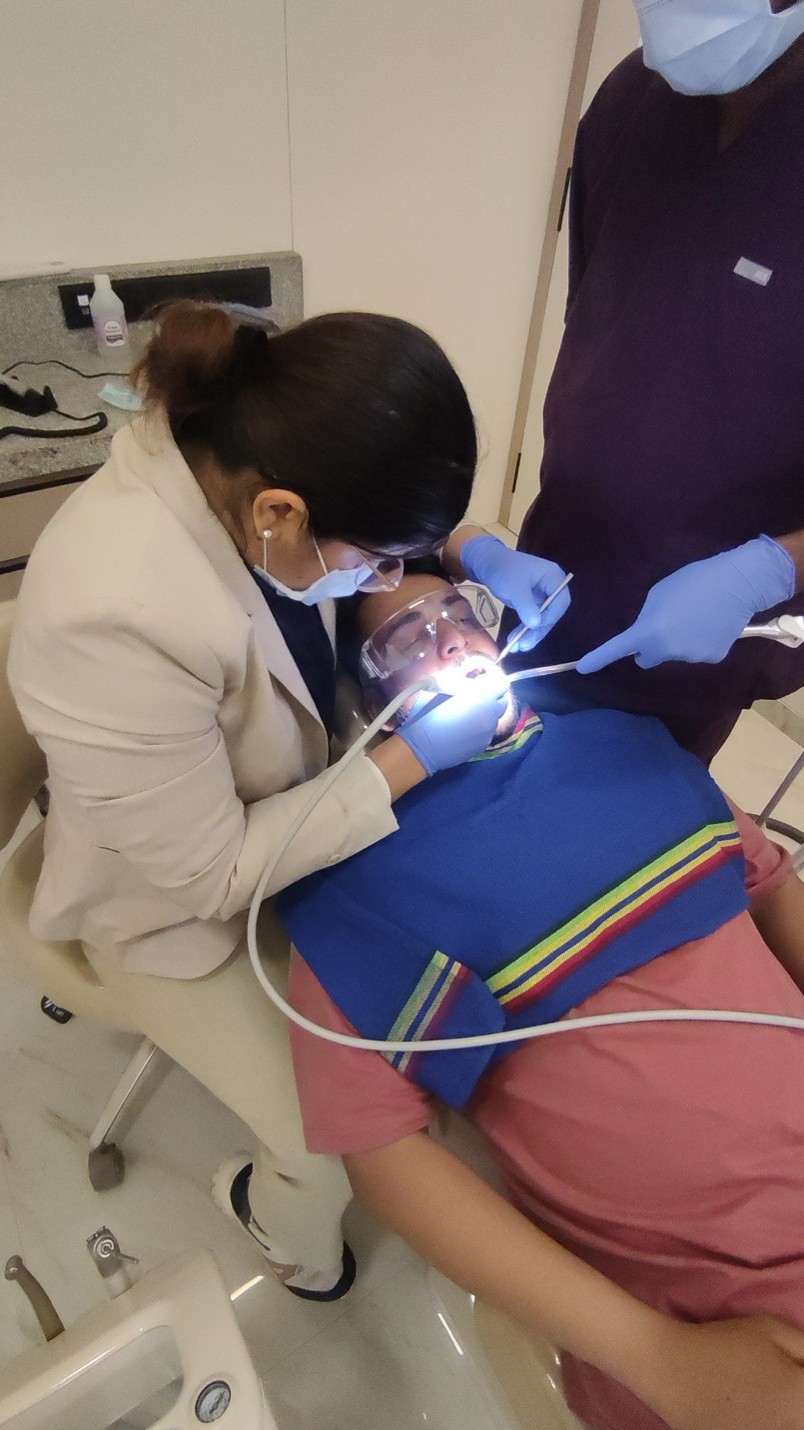Tooth Sensitivity 6 Weeks After Filling

Good oral health is not just a reflection of hygiene—it’s a window to overall well-being.
Dental issues, no matter how small, can significantly affect your quality of life. Whether enjoying your favorite ice cream or sipping a hot beverage, tooth sensitivity can turn everyday pleasures into discomfort. According to global studies, around 2.3 billion people suffer from untreated dental conditions, with millions undergoing dental fillings annually to address cavities.
Dr. Ankita Gehi, the trusted founder of Aakaar Dentistry, a top-notch Dental Clinic in Bandra West,emphasizes:
"Oral health is not just about aesthetics; it mirrors self-care and reflects your overall health. Dental fillings play a key role in restoring functionality and maintaining the integrity of your teeth. Regular dental check-ups ensure addressing minor issues before they become major problems, preserving your oral health in the long term."
Holding a Master’s Degree in Prosthodontics and Implantology, Dr. Ankita Gehi is a sought-after Dentist in Bandra.

This blog explores the common concern of experiencing tooth sensitivity 6 weeks after filling, its causes, management tips, and when to seek professional intervention.
Is It Normal to Experience Sensitivity After a Filling?
Tooth sensitivity weeks after a filling is common and often resolves on its own. However, understanding the root causes can help alleviate your discomfort.
Possible Causes of Sensitivity After a Filling include:
- Inflamed Dental Nerves. During a filling procedure, the nerves within the tooth may get irritated. This can result in temporary sensitivity that lingers for weeks.
- High Filling Placement. If the filling is slightly elevated, it can put extra pressure on the tooth when biting or chewing, causing prolonged discomfort.
- Adjacent Tooth Sensitivity. Sometimes, the neighboring teeth may feel sensitive due to the filling process, even though they were not treated directly.
- Material Used in the Filling. Certain filling materials, like composite resin, may conduct temperature changes more effectively, triggering sensitivity to hot or cold foods.
- Underlying Decay or Damage. In some cases, persistent sensitivity may signal incomplete decay removal or a developing infection.
Is tooth sensitivity affecting your daily routine? Consult an experienced dentist for a thorough evaluation and tailored solutions today.
The right care can make a big difference if you're dealing with lingering sensitivity.
Managing Tooth Sensitivity After a Filling
Practical tips for managing sensitivity include:
- Use Desensitizing Toothpaste
Specially formulated toothpaste can help calm the nerves in your teeth, reducing sensitivity over time. It also creates a protective barrier that minimizes discomfort from temperature changes. - Avoid Trigger Foods.
Steer clear of extremely hot, cold, or acidic foods that can exacerbate sensitivity. Incorporating neutral-temperature foods into your diet can also promote faster recovery. - Maintain Oral Hygiene.
Regular brushing and flossing help keep the teeth clean and prevent further irritation. Switching to a soft-bristled toothbrush minimizes additional stress on sensitive teeth. - Apply Fluoride Treatment.
Fluoride strengthens enamel and reduces discomfort caused by weak or exposed areas. It also helps in remineralizing the enamel, providing better long-term protection. - Chew Gently.
Avoid putting unnecessary pressure on the filled tooth while chewing, especially hard foods. Instead, focus on using the opposite side of your mouth until the sensitivity subsides.
Dr. Dhananjay Hemmady, the seasoned Chief Dentist at Aakaar Dentistry, advises:
"Be patient with your recovery. Small adjustments, like using a soft-bristled toothbrush, can make a significant difference. A professional assessment is crucial to address the issue if the pain persists. Remember, early intervention can prevent potential complications and restore your peace of mind."
With 20+ years of expertise, Dr. Hemmady has earned his place as a top-tier Dentist in Bandra West.

Lingering sensitivity isn’t always a cause for concern, but some situations require professional attention.
When to Consult a Dentist
Situations that require immediate consultation include:
- Sensitivity persists beyond 8 weeks or worsens over time.
- The tooth becomes painful when chewing or biting.
- You experience swelling or unusual discoloration around the affected tooth.
- A sharp or throbbing pain interrupts your daily activities
At Aakaar Dentistry, the experts stress:
“Your dental health journey doesn’t have to be overwhelming. We’re here to provide timely care and help you regain comfort and confidence in your smile. Never ignore persistent sensitivity or pain, as these symptoms often indicate an underlying issue that needs immediate attention. Trust that with the right care, your dental concerns can be effectively resolved.”
Experiencing discomfort weeks after a filling? Seek guidance from a reliable dentist to confidently resolve your dental concerns.

CONCLUSION
Caring for your teeth is vital for both functionality and appearance. Modern dentistry ensures that even complex issues, like sensitivity after fillings, can be managed effectively.
Acclaimed Implantologist - Dr. Ankita Gehi encourages:
“Early attention to dental care fosters lifelong health and happiness. Developing good habits from childhood not only prevents dental issues but also sets the foundation for overall well-being. Our team is here to provide expert guidance and compassionate care every step of the way, ensuring that your smile remains a source of confidence throughout your life.”
Still have questions about dental sensitivity and fillings? Let’s address some of the most common concerns to help you take the next step toward better oral health.
FAQs
Yes, stress-related teeth grinding or clenching can cause sensitivity and wear down tooth enamel. This repeated pressure weakens the tooth’s structure, making it prone to discomfort. Over time, untreated grinding may also lead to cracks or fractures, worsening sensitivity.
If your bite feels uneven or you experience discomfort when chewing, the filling may need adjustment. Overly high fillings can create excess pressure on the affected tooth, causing irritation and pain. Prompt correction by your dentist ensures comfort and prevents further complications.
Yes, your dentist may recommend alternative materials like gold or porcelain for reduced sensitivity. These materials are more biocompatible and can provide enhanced durability and comfort. Consulting a dental expert ensures the right material is chosen for your specific needs.
Rinsing with warm saltwater or applying clove oil can provide short-term relief, but professional care is essential for long-term solutions. Additionally, using over-the-counter desensitizing gels can help ease discomfort temporarily. Remember, home remedies are a stopgap; expert evaluation is necessary for sustainable results.
Most fillings last 5–15 years, depending on the material and oral hygiene habits. Consistent dental check-ups and good care can extend their lifespan significantly. However, wear and tear over time may necessitate replacement to maintain oral health.
Worried about tooth pain 6 weeks after filling? Book an appointment with an expert to ensure lasting relief and restored comfort today.
Disclaimer: The information shared in this content is for educational purposes only and not for promotional use.

